Viewing the general trend of China's undertaking from the perspective of the world pattern
Consider two key issues from the perspective of the global landscape
Currently, the world is undergoing a historic period of change, and China is following the trend of history. Since 2010, Made in China has been ranked first in the world for 14 consecutive years, with a global share of 31.6% by 2024. This trend is similar to the experiences of the United Kingdom and the United States in history. Before 1920, Made in the United Kingdom ranked first in the world, maintaining its position for over 100 years, while Made in the United States led the world for 90 years since 1920. If we can maintain this trend for 90 years until 2100, then we need to think from the perspective of the world order on how to sustain this trend. This requires us to pay attention to two key issues.
Firstly, internal issues. It is crucial to deepen the reform of the market economy system and rules and improve the rule of law in order to maintain the development trend of 80 to 100 years. At the same time, we also need to carry out significant reforms in areas such as income distribution and technological innovation, gradually making domestic demand and technology the main driving forces of China's economic development. Expanding domestic demand is conditional, requiring stable income growth, reasonable expectations, and confidence in the future. At the same time, the social security system also needs to be further improved. Confidence and expectations stem from the rule of law, and we should deeply understand this and further improve the rules of the market economy, with the most important being the principle of equality and fair competition among market entities. Only by establishing these basic concepts can we further continue the competitiveness of modern manufacturing industry.
Secondly, external issues. We must recognize the importance of external demands. Expanding domestic demand is certainly important, but it does not mean that external demand is not important. Expanding opening up remains an important institutional guarantee and driving force for China's economic development. We need to pay attention to the current situation of external demand in the global landscape, especially in developed countries, as they have extremely strong purchasing power. For example, the United States accounts for 28% of global consumer demand and is the world's largest consumer market, along with the European Union and Japan. However, the changing global landscape today poses serious challenges to international trade rules. After taking office, Trump challenged the international trade rules based on the principles of the World Trade Organization. This means that in the new era, we need to think about how to build a 2.0 version of the World Trade Organization rules. Some people say that the organizational functions of the World Trade Organization are not sound, and even believe that the World Trade Organization is dead, but I believe that global economic growth is still based on the flow of capital, goods, services, talent, and technology. Without the free and efficient flow of these elements, the global economy cannot grow effectively. In the past few decades, the stable growth of the global economy, especially the rapid growth of the Chinese economy, has benefited from the influence of these important factors.
Therefore, we need to think about the 2.0 version of the World Trade Organization rules and order based on future trends. Excessive tariffs are not the future of the world economy, and both China and the United States, as well as the international community, need to find a relatively optimized rule that is acceptable to both parties. Based on the rules of the World Trade Organization, the two most important points are the free flow of factors and low tariffs, which are the lifeline of international trade activities. Although the new rules may have certain peculiarities in terms of tariffs for some countries, what new features should future rules have? We need a systematic and comprehensive study.
In the face of the current complex international economic and trade relations and rule adjustments, we must maintain a high degree of rationality and consider these strategic issues from a future strategic perspective. To maintain the prosperity and development of the Chinese economy, it is necessary to handle these important sensitive issues both domestically and internationally correctly.
The Chinese economy is developing rapidly and moving towards modernization, but our understanding of modernization is sometimes not comprehensive. The modernization of a country contains not only a highly developed economy, but also a highly civilized society. The rule of law is the cornerstone of modern society, the spirit of contract is the bond that maintains modern society and financial order, and transparency is the basic characteristic of modern society. We need to deeply reflect on the connotation of modernization in all aspects. We have the responsibility and obligation to provide a correct interpretation of modernization in our respective fields, so that all sectors of society can deeply understand the special role that finance, international trade rules, and other aspects will play in China's future. We cannot assume that modernization is almost achieved just because our income has increased. We need to interpret the common sense and principles of economics from a broader perspective, from the perspective of future development trends and the goals of China's modernization construction.
Finance plays an irreplaceable and important role in a country's modernization process
In the past period, there was prejudice and misunderstanding towards finance in Chinese society. The problems in China's economy and even society cannot be attributed to finance. This is actually an incorrect understanding of the irreplaceable and important role that finance plays in a country's modernization process.
Regarding the value of finance, it is necessary to observe the relationship between economic development and financial evolution, as well as the reasons for financial changes, from the long river of history. Why did finance, its formats, and functions undergo such significant changes after the first industrial revolution in the 1760s? The reasons for this come from social demand, economic restructuring, technological innovation, and changes in industrial forms. Finance serves the real economy. With the changes in the form and structure of the real economy, finance is constantly innovating to adapt to changing demands. The role of finance is crucial to the success of the global economy today. It is hard to imagine what would have happened without continuous innovation and change in finance? Perhaps it is still in the era of bill exchange or even barter.
Over the centuries, finance has undergone tremendous changes, especially since the 1960s, when marketization has driven the disintermediation and structural transformation of finance. Market based financial disintermediation is the driving force and logical starting point of financial structural transformation. Only through financial disintermediation can financial formats become so diverse, functions become more diverse, and finance better meet the needs of the real economy. Entering the 21st century, due to the development of information technology and communication technology, finance has entered a second era of disintermediation. If the first disintermediation is based on marketization and focuses on financing, then the second disintermediation is based on informatization and focuses on payment. The secondary disintermediation of finance has fundamentally changed its functions, greatly expanding the financial functions that were previously constrained by physical space.
On the basis of the economic function of finance, finance derives its important social value. The social value of finance is mainly manifested in several aspects: firstly, a sound rule of law is the cornerstone of the survival of finance. Finance has very strict requirements for the rule of law. In a society with imperfect rule of law, finance, especially modern finance, is difficult to develop. The survival of finance is based on a sound rule of law, which is a fundamental element of a civilized society. The progress and development of finance are feeding back the improvement of the level of social rule of law. The transformation of finance can effectively promote the continuous improvement of the level of rule of law in the country and society. Secondly, the spirit of contract. The spirit of contract is a social extension of a country's rule of law spirit. It is hard to imagine a country with imperfect rule of law, where society has a high degree of contractual spirit. A high level of contractual spirit must be rooted in a sound rule of law, profound legal concepts, and long-standing legal traditions. The strict spirit of contract does not emerge out of thin air, but is based on the fertile soil of a rule of law society. The spirit of contract is the key to maintaining financial order. The emergence of a large number of economic and financial contract lawsuits is a manifestation of the lack of social contract spirit. Thirdly, transparency. The logical starting point of fairness is transparency. When all information is open and transparent, the realization of fairness has a social foundation. The lifeline of modern finance is transparency, as financial transactions are essentially a special form of information exchange. Transparency is an important pivot of modern civilized society. Therefore, the improvement of transparency in modern finance contributes to social progress and the enhancement of civilization. Because of this, finance is essentially a force for society to move towards civilization.
(The author is the former Vice President of Renmin University of China, Dean of the National Institute of Finance, and a national first-class professor)




